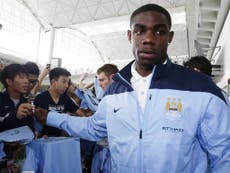Azeem Rafiq’s struggle with mental health shows how much we need more diversity in sport
Discrimination will deter both underrepresented individuals in the industry and others hoping to be them

Your support helps us to tell the story
From reproductive rights to climate change to Big Tech, The Independent is on the ground when the story is developing. Whether it's investigating the financials of Elon Musk's pro-Trump PAC or producing our latest documentary, 'The A Word', which shines a light on the American women fighting for reproductive rights, we know how important it is to parse out the facts from the messaging.
At such a critical moment in US history, we need reporters on the ground. Your donation allows us to keep sending journalists to speak to both sides of the story.
The Independent is trusted by Americans across the entire political spectrum. And unlike many other quality news outlets, we choose not to lock Americans out of our reporting and analysis with paywalls. We believe quality journalism should be available to everyone, paid for by those who can afford it.
Your support makes all the difference.When an article is headlined “on the brink of suicide”, it grabs your attention. We react. So when Azeem Rafiq, the former Yorkshire cricketer, revealed to ESPNcricinfo that he had found himself in this position following systemic racism while playing for this prestigious county, we did just that.
Amidst the frenzied activity and earnest statements of condemnation and intent, however, one of the most important messages was nestled a little deeper. Not in neat soundbite form. Instead, it was how Rafiq had come to make those revelations in the first place. In a previous interview with Wisden.com, Rafiq had meant to be discussing his post-playing catering business. But it had gone further, and deeper. He’d been asked about his teammate, the England international Adil Rashid. He’d become "emotional". And then, slowly, "a lot more came out".
When that happened, Rafiq was talking to Taha Hashim, another British Asian. Hashim, a young journalist, has since said that "growing up, every British Asian player was a hero in my eyes, Azeem being one of them".
“You can’t be what you can’t see” is a common refrain of those arguing for better representation of women, ethnic minorities and others who have often found themselves outside the white, middle-class, heterosexual male norm.
Without familiarity, engagement can be difficult; we cannot relate to stories of overcoming adversity, nor empathise with those of different backgrounds or upbringings. We’re less comfortable, and it would be unusual were we not to feel this way. The problem is, however, that for so many British Asians, British cricket – its players, its administrators, its media – remains an unfamiliar place.
Players are the ones who can be seen, but it is the media who tell their stories. And without a media which represents its population, those stories won’t be told. Earlier this year, the Financial Times’ sports editor, Murad Ahmed, interviewed Moeen Ali. The interview started with a greeting familiar to the two Muslim men. “Assalamualaikum,” said Ali. “Walaikum Assalam,” responded Ahmed. They discussed their shared background, faith and, aided by a mutual love of kebabs, delved into politics and socio-economic factors to a depth Ali had never previously unveiled.
Similarly, last year, Vithushan Ehantharajah, now of The Independent, wrote about English cricketer Jofra Archer and his widespread use of "Black Twitter". This is a phenomenon first cultivated by African Americans, and adopted into wider black culture, where users of the social media site convey a stream of consciousness through unfettered tweets, mainly using slang and colloquialisms. It’s a phenomenon which most white, British, middle-class cricket fans would never have known existed. Instead we looked on at the deluge of Archer’s tweets over the years with patronising affection at best, slight bewilderment otherwise. Now, we had an explanation, a window into a world of which we would not otherwise have known existed.
This is not a comment on individual journalists’ abilities. But these are journalists from a broader range of backgrounds and interests who have reached a level of engagement and understanding inaccessible to the noisy majority who continue to dominate sport’s press boxes and newsrooms.
Right at the bottom of the interview, Rafiq, who once captained Yorkshire, urges cricket’s authorities to "stop looking at the issue of race as a PR or marketing activity". Diversity is the new buzzword in this age of vocal anti-discrimination PR and marketing, but it does not equate to lasting change; it is the first step. The ineffectiveness of the “one-and-done” phenomenon of including just one woman, or British Asian, or black person, on an administrative board in an overt attempt at diversification has been well-researched and extends to the media too. It is also extremely isolating.
When Sky Sports announced it was no longer renewing the contracts of three of its longstanding, white, male football pundits last month, social media’s ire quickly found refuge in the belief that this was at the behest of a diversity drive. By implication, therefore, this was the fault of two of the very few black pundits in the industry, Micah Richards and Alex Scott. The response was belittling, and presumptuous, focusing on the colour of Scott and Richards’s skin, rather than their ability.
Women, black people and British Asians remain woefully underrepresented in sports media, whether it be writing for a sports-specific magazine or fronting a popular national broadcast. Kick It Out, the campaign for equality in football, published a report charting a 229 per cent rise in reports of discrimination that it had received via social media. There is no sign of this slowing down. Discrimination will deter both underrepresented individuals in the industry and others hoping to be them.
Representation, however, is solidarity: it is finding someone else to talk to, to support you, to not have your name be singled out. A more representative media is also the only way we can hear more of the remarkable stories of people like Azeem Rafiq, and act on them.



Join our commenting forum
Join thought-provoking conversations, follow other Independent readers and see their replies
Comments